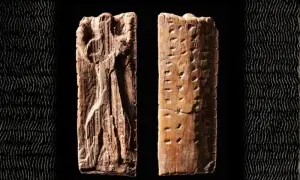Anime luminary Maruyama warns Japan’s top spot at risk
4 min readJapan’s powerhouse anime business risks being overtaken by rising Chinese competition because a tilt towards commercialism has stifled creativity, industry heavyweight Masao Maruyama has warned.
Maruyama, a protege of manga great Osamu Tezuka, said he fears Japan is losing its edge.
“In Japan, people are no longer trained in animation,” he told AFP in an interview.
“The only reason China hasn’t quite caught up with Japan yet is because of a bunch of restrictions imposed on free expression there,” he said.
“If more freedom is unleashed, Japan will be overtaken in no time.”
Maruyama doesn’t draw or direct, but he has clout that few in Japan’s anime industry can match because of the breadth of the behind-the-scenes roles he has played – from studio founder and recruiter to fixer.
The 81-year-old acknowledged his career was in its twilight, and Maruyama was far from optimistic as he prepared to leave behind an industry he helped shape.
He fears Japan is so hell-bent on cranking out money-spinning genres, such as those starring “kawaii” cute female characters, that its anime “doesn’t necessarily outshine” America’s Disney or France’s arthouse productions in terms of creativity.
He warned that occasional successes from this prolific approach have distracted Japan from systematically fostering next-generation talent, even as China invests aggressively in young animators.
‘God of manga’
Maruyama has risen from a protege of the late Tezuka, the “God of manga” known for the pioneering cartoon series “Astro Boy”, to a force behind some of Japan’s most acclaimed anime directors, overseeing three animation studios along the way.
It was partly a desire to keep Tezuka’s works alive that convinced Maruyama to take on his current project “Pluto”, adapted from a manga with an “Astro Boy” arc.
The upcoming series for Netflix, of which he is executive producer, is steeped in themes such as war and discrimination that some feel are particularly relevant today.
Maruyama is unapologetic about his view that he is “the most authentic inheritor of Tezuka’s DNA”, from his blithe ignorance of budgets to an uncompromising work ethic that he says borders on “selfish”.

Like Tezuka, “I flip-flop all the time, saying something totally different from what I said a day before”, Maruyama said with a chuckle.
“But creating works is all about challenging yourself to do something new, regardless of what you said in the past. That makes you selfish in a way, and it’s a trait I’ve inherited in its pure form.”
Maruyama has helped bring to life hundreds of anime shows and films in his nearly 60-year career, including boxing saga “Ashita no Joe”, critically acclaimed “Ninja Scroll” and award-winning “In This Corner of the World”.
He is content to play second fiddle to directors, and is known for handling everything from pitching projects and raising funds to hand-picking animators.
‘Cook and clean toilets’
His deep involvement in productions earned him a reputation as a shadow shogun, but eventually he began stepping into the limelight.
His strategy was to use his credentials to promote and vouch for directors he felt deserved attention, animation history researcher Masahiro Haraguchi said.
From Mamoru Hosoda (“The Girl Who Leapt Through Time”) to Satoshi Kon (“Perfect Blue”) and Sunao Katabuchi (“In This Corner of the World”), many of Japan’s top-notch anime directors saw their careers take off after working under Maruyama, Haraguchi said.
“Maruyama’s magic was to team up with these directors and cause their transmogrification,” he said.
Maruyama, however, jokes that all he does is “cook and clean toilets”.
“I have no special skills,” he said.
“I don’t steer the directors but I just follow them and their talent.”
His work ethic is legendary and is seen in the names of his three studios Madhouse, MAPPA and M2, which he says all start with ‘M’ for a reason.

“It means I’m masochistic,” he said, breaking into a wide grin.
“The more challenging, painful and excruciating the project is, the more motivated I become.”
Maruyama said he is determined to remain active “as long as my body and mind permit”.
But that doesn’t mean he is oblivious to his mortality.
He organised a flamboyant living funeral for himself last year, painting his face white to appear as a ghost to the amusement of his friends and colleagues.
“I thought then: ‘well, I’ve had a good life’.”
For the latest news, follow us on Twitter @Aaj_Urdu. We are also on Facebook, Instagram and YouTube.



























Comments are closed on this story.